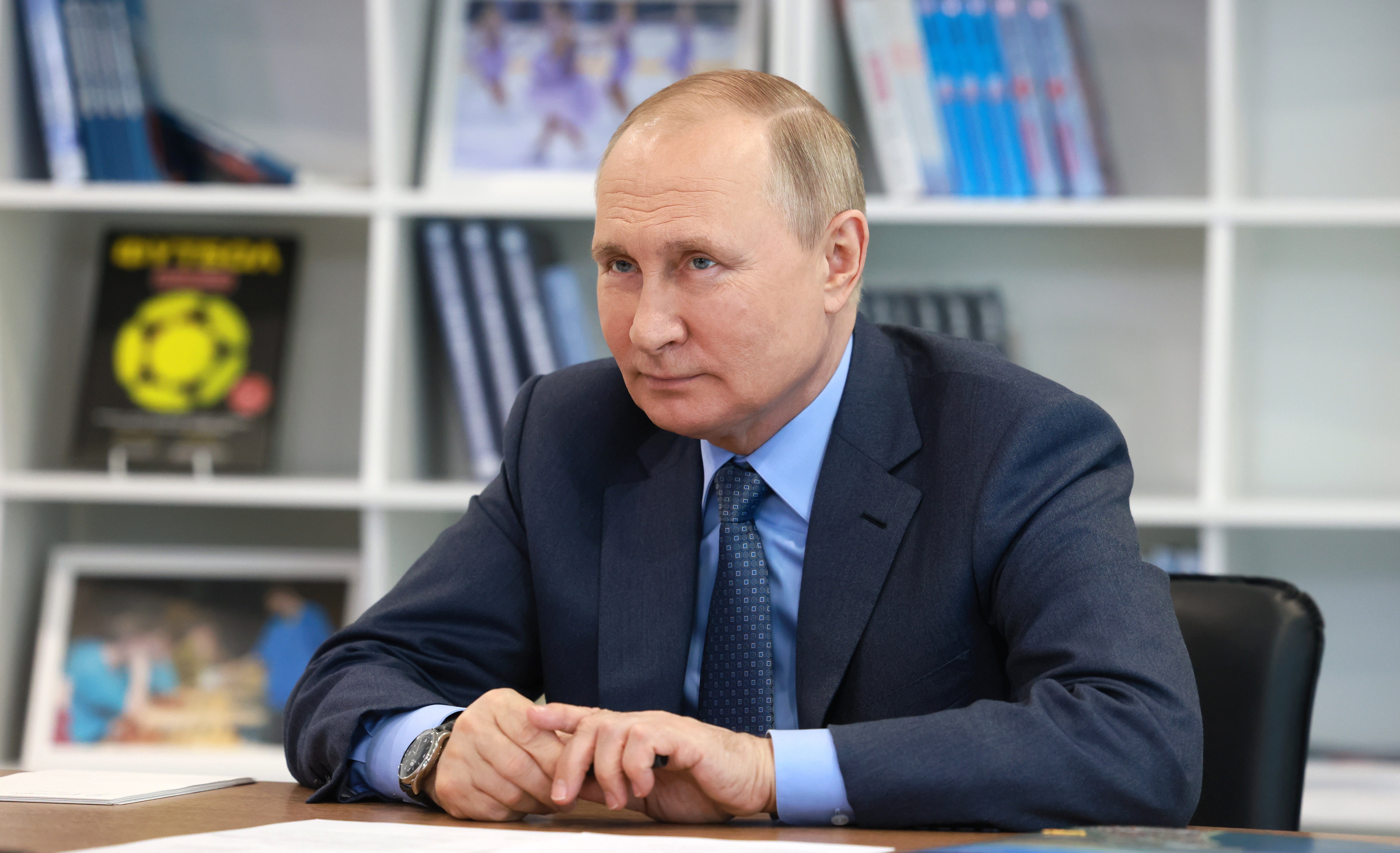Whatever happens next, Putin’s epitaph is already written – a murderer, a monster, a maniac
His attack on Ukraine was an act of political insanity, perhaps even political suicide. But the signs were there for months beforehand for anyone who wanted to see


Your support helps us to tell the story
From reproductive rights to climate change to Big Tech, The Independent is on the ground when the story is developing. Whether it's investigating the financials of Elon Musk's pro-Trump PAC or producing our latest documentary, 'The A Word', which shines a light on the American women fighting for reproductive rights, we know how important it is to parse out the facts from the messaging.
At such a critical moment in US history, we need reporters on the ground. Your donation allows us to keep sending journalists to speak to both sides of the story.
The Independent is trusted by Americans across the entire political spectrum. And unlike many other quality news outlets, we choose not to lock Americans out of our reporting and analysis with paywalls. We believe quality journalism should be available to everyone, paid for by those who can afford it.
Your support makes all the difference.Vladimir Putin is an accident of history. He should never have been president, but now, we all run the risk of becoming collateral damage in a mistake all of his own making.
His attack on Ukraine was an act of political insanity, perhaps even political suicide. But the signs were there for months beforehand for anyone who wanted to see.
As early as last fall, American intelligence services began receiving “disturbing and detailed” information concerning plans to launch a “large-scale new invasion” into Ukraine. Putin was driven by ambition, as well as a sense of “resentment” towards the west and the insecurity of his position. There was no rational or strategic need for him to launch this aggression, on the contrary. Now, it is not only Ukraine that will pay the price – the entire world will.
There are many who believe he is mentally unbalanced – especially senior members of the Washington administration – and dangerously so. But there is also the possibility that this was the outcome he wanted from the very beginning.
Now, though, there is far more than his dignity at stake. His military misadventure into Ukraine has forever exploded the myth of Russian military might. Despite the pomp and sabre-rattling of the annual Moscow military parades, his forces have been revealed to be woefully under-trained, unprepared for the rigours of combat and appallingly ill-disciplined. His generals’ tactics are outdated and their equipment very badly maintained to the extent that much of it has very quickly become unserviceable.
The world has been spared the military space forces that Putin has been boasting of, saving the world a conflict in a brand-new dimension, but the spectre of Putin going for the nuclear option remains. CIA director William Burns has warned of the danger of Russia’s use of tactical or small nuclear weapons if Putin finally despairs of achieving his aim of victory in Ukraine.
Putin has been increasingly referring to Russia’s nuclear arsenal culminating with his boasts of the potency of the brand new SARMAT intercontinental ballistic missile. The tenor and volume of these boasts has been matched by the scope and scale of the Russian forces’ failure in the field.
Any rational person would immediately know that to launch such a weapon would precipitate if not a full-scale nuclear war and mutually assured destruction, then definitely the obliteration of Russia. There can only be two explanations for Putin’s behaviour; either he is mentally incapable of understanding the consequences or he is a typical bully, borrowing from the old Soviet playbook beloved by dictators like Nikita Khrushchev and the Cuban missile crisis that he oversaw.
It is fascinating at this juncture to analyse the change in register of Putin’s speeches. He has begun to use terms that his opponents would have used, in a bid to weaponize them; thus “blitzkrieg” which was initially used to describe his generals’ failed invasion of Ukraine, now describes the rapid onslaught of international sanctions on the Russian economy – which he now paints as a failure on the west’s part.
In starting the war against Ukraine, Putin based his strategy on a number of false assumptions: that Ukraine is weak, that the majority of Ukrainians will not oppose RF and be happy to meet Putin in Ukraine, that Europe will not offer a tough response, that the Russian economy will be ready and able to resist sanctions with its fabled foreign exchange reserve; and, finally, that the Russian military is modern and will fight effectively.
He was convinced that Washington’s European allies were too preoccupied with their own domestic politics, to care about an invasion of Ukraine, after all, he got away with invading the Crimea in 2014.
It’s a very far cry from his early undistinguished career, working in the shadows, greasing the wheels. Derided by his peers, fellow students at the Andropov Institute of Foreign Intelligence, as “cigarette butt” or “pale moth”, Putin was a people pleaser. The same sources who will tell you about his time as a student, will tell you how he was involved in a money laundering scandal while he was still a minor political clerk and unemployed.
Later he put his foreign experience in Germany especially, to good use in further fraudulent operations in foreign countries. His ascent to the highest office in the land was the direct result of corruption, his backers sponsored him to protect the assets of former President Boris Yeltsin’s family.
Today, increasingly isolated, his views have hardened. Putin remains determined, in his public utterance at least, that Russia will win the war in Ukraine, despite Russian forces’ ignominious failure to take Kyiv thanks to the tigerish resistance of the Ukrainian forces.
As late as mid-April, he told Austrian Chancellor Karl Nehammer that he was confident of winning the war. Nehammer, who was the first EU leader to meet with him in Moscow, said that he believed Putin lives in his own little world. At the end, Putin told him in German, “Better war sooner than later”. It was proof that Putin knew exactly what was going on.
Putin is further limited by the intellectual shallowness of his inner circle, none of whom offer him any form of constructive debate. He is, in the words of his former classmate and ex-KGB officer Yuri Shvets, surrounded himself with the larvae of the “white moth”. None of them are worldly, none of them have the capacity to introspect and, significantly, none of them have good relations with the west.
To keep up to speed with all the latest opinions and comment sign up to our free weekly Voices Dispatches newsletter by clicking here
Dmitry Medvedev, the deputy chair of the Russian Federation Security Council, is a perfect example of this: “To prevent a possible attack by enemies on Russia and save the people in Donbass – this is precisely the point of our country’s “special operation,” he said, echoing Putin’s line on the illegal invasion of a sovereign country.
He is aided and abetted by a slavish media, after his regime clamped down on independent voices and dissenters, all working around the clock to spin every defeat as a tiny victory in a much bigger Russian masterplan to return Ukraine to Russia and “de-Nazify” it in the process.
The events of the last month have challenged Putin. Following May 9’s so-called “Victory Day”, Putin is likely to double down and defeat the Ukrainian army – paying little heed to the cost in civilian casualties – as he has already done in the south in Mariupol.
Whatever the outcome, his legacy has already been indelibly entered into the history books in blood. He will be remembered forever as a murderer, a monster and a maniac who burnt an entire country to the ground for his own vanity.
Natalia L. Yakovenko is a professor at the Institute of International Relations, Taras Shevchenko National University of Kyiv
Join our commenting forum
Join thought-provoking conversations, follow other Independent readers and see their replies
Comments